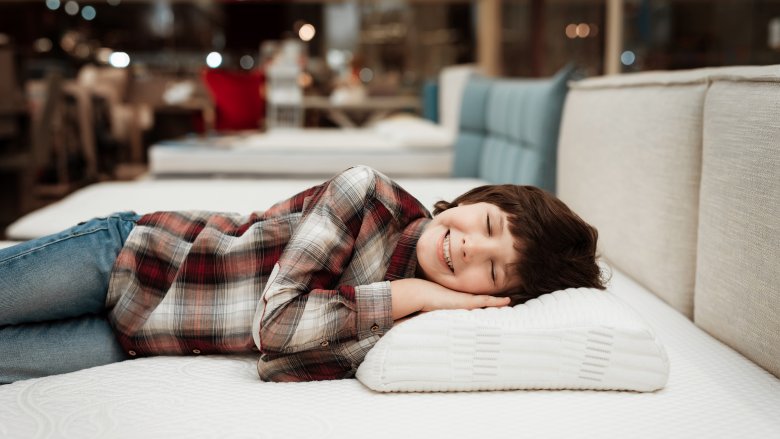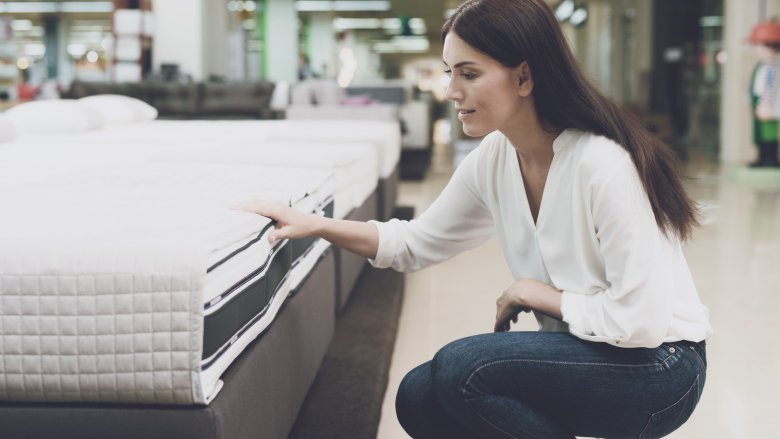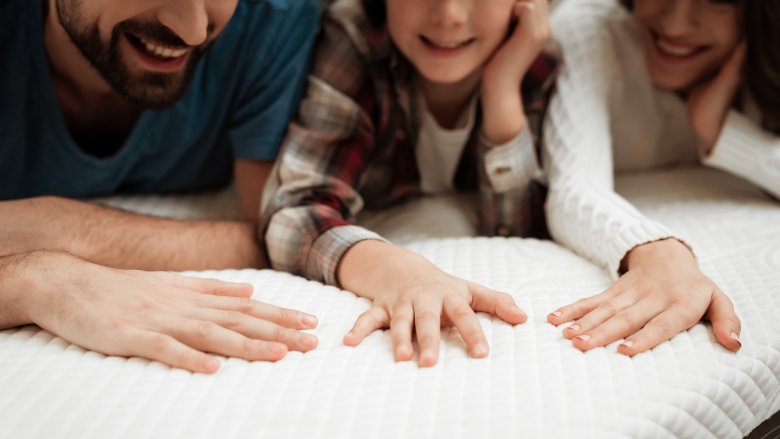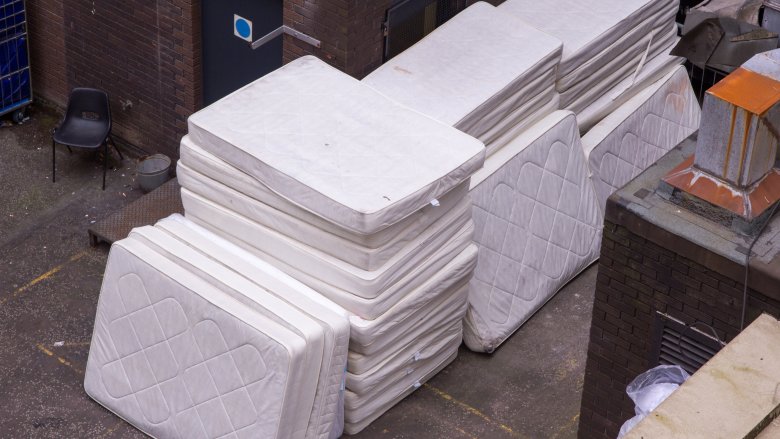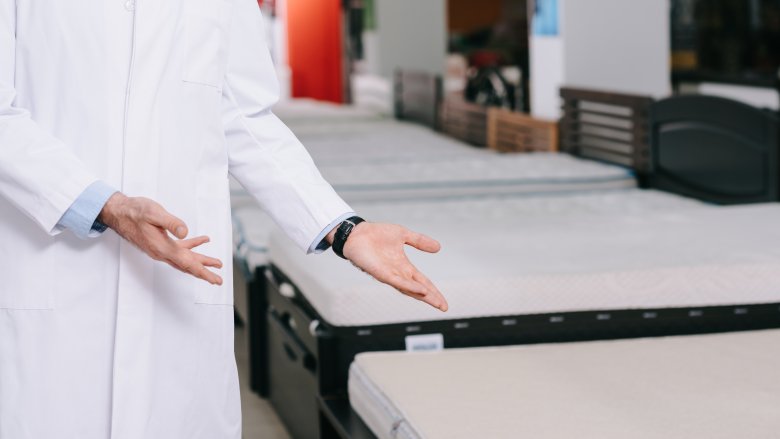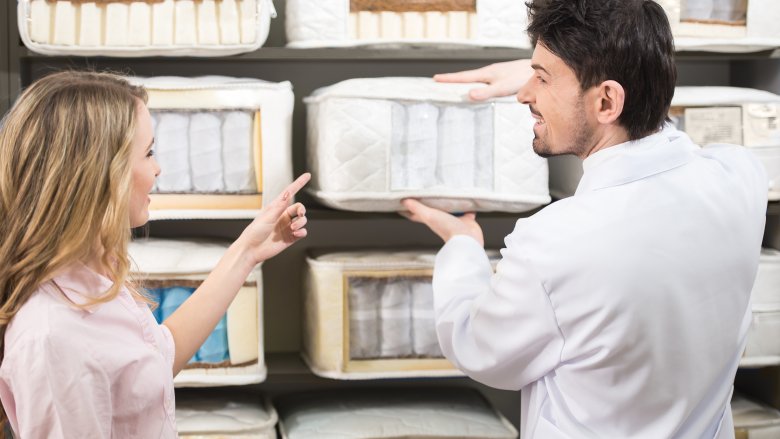How Mattress Stores Totally Rip You Off
There are a lot of things in life that are pretty terrible, and there are a lot of purchases that have become necessary for our first world standard of living that leave buyers with the feeling they've just been ripped off. That salesperson who was so nice when they saw someone walk through the door with a credit card in their hand and confusion in their eyes? They're giggling behind the customer's back as they leave confused and considerably poorer.
Cars depreciate as soon as there's a signature on the dotted line, and mattresses are just as bad except that no one wants to buy a used mattress. No one likes shopping for a mattress, and that's because most people know just enough to realize it's next to impossible to get an honest deal. Mattress stores are notoriously crooked, and they have a ton of tricks up their sleeve to help them get the upper hand over customers. Knowing what they are might help a savvy shopper save even hundreds of dollars, and it's incredibly important. Who would have thought a mattress store is a commercial battleground?
Playing the name game
At a glance, mattress stores seem to offer some serious promises. They always have the lowest prices, they say, but they can't all have the lowest prices ... can they? Well, they sort of can, and Mattress Makers says it has to do with those extravagant and sometimes weird names mattresses are given.
Here's how it works. One mattress shopper — called Judy, for argument's sake — goes into Karl's Big Bad Mattress Store and picks out a model called the Beautyrest Dreamscape Floating-on-Clouds. It's pretty pricey, though, and Judy wants to make sure she gets the best deal out there, so she jots down the name and starts calling other stores and checking online to see if that really is the cheapest. Only, she can't find anyone else selling a Beautyrest Dreamscape Floating-on-Clouds.
That's because only Karl's uses that name for the mattress. Chances are pretty good that Johan's Best Mattresses is also selling the same exact mattress, only they're calling it the Beautyrest Marshmallow Dream. With different names, it's almost impossible for Judy to know they're the same exact mattress, and that makes price comparison shopping so difficult and so frustrating it's sometimes easier to just pay the price.
Selling gimmicks that don't really matter
Customers walking into a mattress store will probably see a salesperson even before they see any actual mattresses, and that's because they have a lot to try to sell a customer on. Some things are important — like firmness — but there's a whole lot that doesn't actually matter, and only serves to hike up the price, says Slate.
Mattress quilting is one of the biggest scams. People like things that look nice, after all, and all those mattresses laid out in the store have to look a little different. So the top is extra quilted, and anyone who gravitates toward that might be spending some extra cash on something that's going to get covered with a sheet anyway. How about extra thickness? That doesn't make a good mattress more comfortable, it only makes a bad mattress look good. Box springs? Don't need those either — they're so unnecessary they're almost wholly an American thing.
Then there are things like the special "no-flip" mattress. The idea that mattresses need to be flipped regularly so they wear evenly is one of those bits of wisdom that's been handed down through the generations, and when salespeople say they have special (i.e., expensive) no-flip mattresses, that's a gimmick they're trying to sell. According to Business Insider, pretty much all mattresses are one-sided these days, there's no need to flip them, and those salespeople are just trying to cash in on customers' need for convenience and outdated beliefs.
That money-back guarantee is probably B.S.
Testing a mattress in a store for a few minutes definitely isn't the same as sleeping on one night after night, so it's easy to see how the promise of a money-back guarantee is tempting. It might even be worth paying a little more for that peace of mind, right?
Wrong.
Mattress Reports says it's just one of many scams mattress stores are trying to sell. It's only the fine print that usually discloses the fact that customers aren't going to be getting their money back at all, they're just going to be able to exchange the mattress for another one of the same price. Oh, there's not another mattress there the same price? That's okay, you can just pay the difference. There isn't another mattress there that's even remotely suitable? That's okay, you can just get store credit.
There are other catches, too. Delivery fees aren't usually included in the price of the mattress, so customers will be paying them all over again. There might also be restocking fees tacked on. Also, sometimes they won't take mattresses back unless they're in re-sellable condition, but they won't mention that they can't actually sell any used mattresses, so there's that little loophole they love, too.
They're banking on the fact you won't haggle
Go into the vast majority of stores and the price that's on the tag is the price that needs to be paid by anyone wanting to walk out the door with it. Employees at McDonald's probably wouldn't be happy with anyone who tries to talk down the price of the Big Mac, and consumers have grown used to this system of "Here's the price. Pay it."
But not all places are like that, and mattress stores — along with car dealerships — are among the places where customers generally do have room to haggle on price. Industry insiders — and salespeople — think it's expected, and they know the price on the tag isn't the actual price. But do customers? Not always, partially because people are so used to seeing a price and paying it, and partially because the places where haggling is still expected are in stores customers might find themselves in only once or twice every decade. When customers are out of practice on their haggling skills, they're the ones who suffer.
No store sells a used mattress ... right?
Buckle up, because this one's going to get pretty gross.
With all those money-back guarantees and exchange programs, mattress stores are going to end up with a lot of returned merchandise. What do they do with all of it? Send the mattresses back to the manufacturer or donate them? Consumer Affairs found there's a good chance some of the mattresses might be re-bagged and sold as "new."
There are a few code words customers should be on the lookout for. If a salesperson suggests they can get a good deal on a mattress that's being discounted because it was "scuffed" in the warehouse, that might not be the case at all — the wear might be because it's a return. Be wary of great deals on "overstock" mattresses, too, because they say this bit of nastiness happens more than anyone wants to think about, and insiders add it's practically an industry standard.
And while the mattress is being delivered, watch for tape on the packaging as a clue it may have been re-bagged. You can also check to see if there's any fading on the mattress top. It's not just returns that can be sold as new but floor models as well, and who wants to be sleeping on either of those?
Retail pricing is insane, and sales are gimmicks
Mattresses are expensive — that's just a fact of life consumers have grown to expect. But they're expensive because most mattress stores mark them up an almost unthinkable amount.
According to Vox, mattress stores tend to mark up their product way, way above cost, then offer sales and deep discounts to make customers think they're getting a good deal when they're really not. That super-soft, luxurious mattress that's on sale for $1,000 is a huge bargain, right? It's marked all the way down from $3,500, so surely the customer is winning this round. Good timing, you lucky duck! Not so fast. The actual value is a lot closer to the $1,000 mark, and anyone who pays anything above that is just gravy for the stores.
They know, after all, that customers don't really know what's inside the mattress and what it's really worth. Consumer Reports gives this guideline: Take the non-sale price or the price they're advertising as "regular," take 50 percent off, and that's about what they should actually be charging.
That "green" label you're paying up for might not mean anything
Buying something that's green, organic, or sustainable generally means it's going to cost more. Consumer Reports says anyone looking to buy a mattress with a green sticker on it can expect to pay prices in the thousands, but some of those green labels don't mean jack.
There's a whole slew of green labels that can appear on mattresses, and they all have to meet different standards to get them. Some of those standards aren't very high, but mattress stores aren't going to tell customers that. Take GOTS, the Global Organic Textile Standard label. They're one of the best, require 95 percent of mattress materials to be certified organic, and even those that aren't organic have to meet certain manufacturing standards.
But on the other end of the spectrum are labels that just claim a mattress is made with organic materials. Legally, that label can be on there as long as any part of the mattress — in any percentage, even a tiny one — is made with organic materials. There are no guidelines regarding how organic it has to be, and there are also no guidelines on what chemicals can be used for manufacturing. Is that worth paying hundreds extra for? (No. No, it is not.)
Selling completely pointless warranties
When the Huffington Post spoke with the co-owner of the mattress manufacturer Christeli and asked what mattress-buying myths they frequently heard customers repeating, one of the biggest was that buying a lifetime warranty was a necessity. It's not, because it's not actually going to do what most customers think it's going to do in part because the wording tends to be very, very vague.
In most cases, that warranty covers whatever is inside the mattress. What's not covered is normal wear and tear or the outside of the mattress. In other words, the part that's going to wear out first. Lifetime, indeed.
Intellibed looked at some of the stipulations of warranties, and found that in many cases, manufacturers know exactly how their product is going to wear. They then write their warranties to exclude what they know is most likely to go wrong. Most also include caveats that void warranties entirely: Use the wrong box spring, the wrong support frame, or stain it in any way whatsoever and the warranty could be void, leaving you out of luck.
There's so, so much lingo
Most people don't buy mattresses every year. The National Sleep Foundation recommends getting a new mattress about every eight years, and that's in a perfect world. Whether it's eight years or longer, it's long enough that most people aren't going to be keeping up to date with all the mattress-buying lingo.
And there's a ton of it. How many average Joes know how air beds, bio-based products, Bonnell Coils, chemicals of concern, coir, Euro-top, fill level, indentation force deflection, pincore holes, and torsion module foundation really affect your nighttime comfort? Those are all real terms defined in GoodBed's mattress glossary, and it's only a small fraction of the terms there.
Mattress Reports says throwing around lingo like this is one technique salespeople use to both confuse the heck out of the customer and explain just why the price tag is heftier than the mattress itself. Because there's so much lingo referring to all different kinds of inner materials and components, it adds to the difficulty in comparison shopping, too. Some of the terms — like "therapeutic" — might not even mean anything, and it's easy for customers to get bamboozled by the babble.
The so-called "comfort" scam
Mattress Reports calls it the "comfort scam," and here's how it works. Mike the Mattress-Buyer tests a bunch of different mattresses in the store, lying on them each for just a few minutes. He picks one he likes, buys it, and takes it home. But he finds out that it's not nearly as comfortable as he thought it was when he bought it. What gives?
Basically, a mattress is only as good as the materials that are used, and manufacturers have figured out that both high-quality, expensive materials and lower-quality, cheaper materials have about the same level of comfort in the store. That's because potential buyers are only lying on them for a few minutes at a time, and once the mattress is in their home, that lower-quality one is going to start to shift and sag a lot faster. Some mattresses will turn lumpy and uncomfortable within a matter of weeks, and that's because those manufacturers opted for using cheaper materials but selling it at a higher price and making more money from a customer who's left tossing and turning.
There's another trick here, too. Some mattress materials, like memory foam, soften in warmer temperatures. That's why stores will keep their showrooms a toasty warm temperature, and it's also why that mattress is suddenly not so memorable when it's unpacked in a cooler bedroom.
Making a private thing very public
What is more private than the things that happen on your mattress? People are rarely more vulnerable than when they're asleep, and it's difficult to get into the sleepy mindset when testing mattresses in a brightly lit showroom, surrounded by strangers, being nodded at by an enthusiastic salesperson.
Here's the thing, according to Best Mattress Brand. Not only are those salespeople there to guide customers toward mattresses with higher commissions, but they also know that customers are terrible at actually picking out the best mattress for them, and they can be easily swayed in such a high-pressure, public environment where they're being forced to talk about something incredibly private.
The Research Triangle Institute has proven just how bad people are at picking mattresses in stores. They had volunteers pick out a mattress, then spend a month sleeping on seven different mattresses. They were monitored to see if people had picked the right one from the showroom floor, and determined that "People are essentially left to chance when trying to select a mattress using the generally recommended 'test drive' on the showroom floor."
Now you know.
